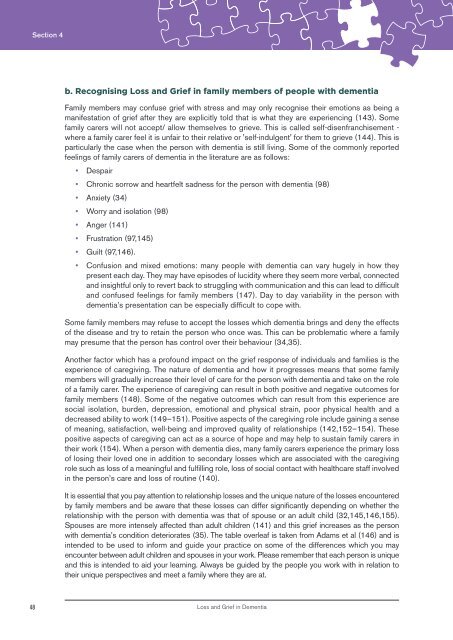Loss and Grief in Dementia
Final-Guidance-Document-3-Loss-Grief
Final-Guidance-Document-3-Loss-Grief
You also want an ePaper? Increase the reach of your titles
YUMPU automatically turns print PDFs into web optimized ePapers that Google loves.
Section 4<br />
b. Recognis<strong>in</strong>g <strong>Loss</strong> <strong>and</strong> <strong>Grief</strong> <strong>in</strong> family members of people with dementia<br />
Family members may confuse grief with stress <strong>and</strong> may only recognise their emotions as be<strong>in</strong>g a<br />
manifestation of grief after they are explicitly told that is what they are experienc<strong>in</strong>g (143). Some<br />
family carers will not accept/ allow themselves to grieve. This is called self-disenfranchisement -<br />
where a family carer feel it is unfair to their relative or 'self-<strong>in</strong>dulgent' for them to grieve (144). This is<br />
particularly the case when the person with dementia is still liv<strong>in</strong>g. Some of the commonly reported<br />
feel<strong>in</strong>gs of family carers of dementia <strong>in</strong> the literature are as follows:<br />
• Despair<br />
• Chronic sorrow <strong>and</strong> heartfelt sadness for the person with dementia (98)<br />
• Anxiety (34)<br />
• Worry <strong>and</strong> isolation (98)<br />
• Anger (141)<br />
• Frustration (97,145)<br />
• Guilt (97,146).<br />
• Confusion <strong>and</strong> mixed emotions: many people with dementia can vary hugely <strong>in</strong> how they<br />
present each day. They may have episodes of lucidity where they seem more verbal, connected<br />
<strong>and</strong> <strong>in</strong>sightful only to revert back to struggl<strong>in</strong>g with communication <strong>and</strong> this can lead to difficult<br />
<strong>and</strong> confused feel<strong>in</strong>gs for family members (147). Day to day variability <strong>in</strong> the person with<br />
dementia’s presentation can be especially difficult to cope with.<br />
Some family members may refuse to accept the losses which dementia br<strong>in</strong>gs <strong>and</strong> deny the effects<br />
of the disease <strong>and</strong> try to reta<strong>in</strong> the person who once was. This can be problematic where a family<br />
may presume that the person has control over their behaviour (34,35).<br />
Another factor which has a profound impact on the grief response of <strong>in</strong>dividuals <strong>and</strong> families is the<br />
experience of caregiv<strong>in</strong>g. The nature of dementia <strong>and</strong> how it progresses means that some family<br />
members will gradually <strong>in</strong>crease their level of care for the person with dementia <strong>and</strong> take on the role<br />
of a family carer. The experience of caregiv<strong>in</strong>g can result <strong>in</strong> both positive <strong>and</strong> negative outcomes for<br />
family members (148). Some of the negative outcomes which can result from this experience are<br />
social isolation, burden, depression, emotional <strong>and</strong> physical stra<strong>in</strong>, poor physical health <strong>and</strong> a<br />
decreased ability to work (149–151). Positive aspects of the caregiv<strong>in</strong>g role <strong>in</strong>clude ga<strong>in</strong><strong>in</strong>g a sense<br />
of mean<strong>in</strong>g, satisfaction, well-be<strong>in</strong>g <strong>and</strong> improved quality of relationships (142,152–154). These<br />
positive aspects of caregiv<strong>in</strong>g can act as a source of hope <strong>and</strong> may help to susta<strong>in</strong> family carers <strong>in</strong><br />
their work (154). When a person with dementia dies, many family carers experience the primary loss<br />
of los<strong>in</strong>g their loved one <strong>in</strong> addition to secondary losses which are associated with the caregiv<strong>in</strong>g<br />
role such as loss of a mean<strong>in</strong>gful <strong>and</strong> fulfill<strong>in</strong>g role, loss of social contact with healthcare staff <strong>in</strong>volved<br />
<strong>in</strong> the person’s care <strong>and</strong> loss of rout<strong>in</strong>e (140).<br />
It is essential that you pay attention to relationship losses <strong>and</strong> the unique nature of the losses encountered<br />
by family members <strong>and</strong> be aware that these losses can differ significantly depend<strong>in</strong>g on whether the<br />
relationship with the person with dementia was that of spouse or an adult child (32,145,146,155).<br />
Spouses are more <strong>in</strong>tensely affected than adult children (141) <strong>and</strong> this grief <strong>in</strong>creases as the person<br />
with dementia’s condition deteriorates (35). The table overleaf is taken from Adams et al (146) <strong>and</strong> is<br />
<strong>in</strong>tended to be used to <strong>in</strong>form <strong>and</strong> guide your practice on some of the differences which you may<br />
encounter between adult children <strong>and</strong> spouses <strong>in</strong> your work. Please remember that each person is unique<br />
<strong>and</strong> this is <strong>in</strong>tended to aid your learn<strong>in</strong>g. Always be guided by the people you work with <strong>in</strong> relation to<br />
their unique perspectives <strong>and</strong> meet a family where they are at.<br />
48<br />
<strong>Loss</strong> <strong>and</strong> <strong>Grief</strong> <strong>in</strong> <strong>Dementia</strong>


